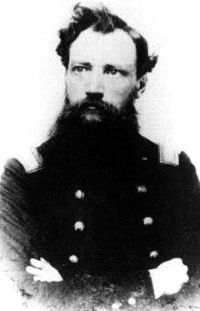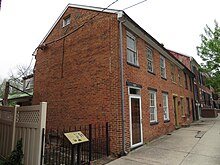Alexander Schimmelfennig
Alexander Schimmelfennig (also: Alexander Ferdinand Schimmelpfennig von der Oye ; * July 20, 1824 in Bromberg , Province of Posen ; † September 5, 1865 in Wernersville , Pennsylvania ) was a Prussian military and revolutionary during the Revolution of 1848/49 . After his escape from Germany in 1854, he emigrated to the United States , where he during the Civil War in the General Union army served.
Life and career before emigration
Alexander Schimmelfennig joined the military in 1842 and served first as a pioneer officer in the 29th Infantry Regiment (von Horn) up to the rank of Unterleutnant ( Second Lieutenant ) and then, from 1847, in the 16th Infantry Regiment , with which he was stationed in Cologne . Here he came into contact with radical political forces that had a lasting impact on his political attitude. He supported the revolution of 1848/49, but was subsequently disillusioned by the peace negotiations to end the Schleswig-Holstein War in 1851.
He supported the opposition to Prussia's attempts to prevent the implementation of the Paulskirche constitution and became a member of the Palatinate Military Commission , which led the defense against the Prussian invasion. In the Battle of Rinnthal on June 17, 1849, he was wounded in the knee, but managed to save himself and probably fled to Switzerland like many other revolutionaries . In absentia, he was discharged from the Prussian military on October 7, 1848 and sentenced to death for his actions during the revolution. In Switzerland he met Carl Schurz , who had also fled there , and both fled to London via Paris . In London, Schimmelfennig became a member of the German Democratic Movement , which existed there and was in clear contrast to the political stance of Karl Marx and Friedrich Engels , who also lived there . On September 15, 1852, he married Sophia von Glümer in London, with whom he had three children (Bertha, Helene Ida and Hermann Alexander Rudolph).
Emigration to the United States
In 1854 Schimmelfennig emigrated to the United States, where he worked for the United States Department of War . Here he established his contacts with other former revolutionaries, the so-called Forty-Eighters . Many of these emigrated revolutionaries from 1848/49 were officers like him at that time and after their emigration now served in the US army . During this time he also wrote his book The War between Russia and Turkey , which was published in Philadelphia in 1854.
The role of Schimmelfennig during the Civil War
Common tests of Schimmelfennig with Carl Schurz to prepare consisting only of German immigrants Cavalry - regiment failed due to the appointment of Schurz to the United States ambassador in Spain by the newly elected President Abraham Lincoln . At the beginning of the Civil War, Schimmelfennig was given command of a regiment of German descent in Pennsylvania. The regiment, which he now led as colonel , consisted of Americans of German descent from the cities of Pittsburgh and Philadelphia in Pennsylvania. It was therefore designated as the 1st German Regiment (of Pennsylvania) and later renamed the 74th Pennsylvania Infantry Regiment . When he was absent for a long time after a riding accident, other applicants wanted to take over this newly established regiment, but this failed due to the influence of Schimmelfennig's friends. Schimmelfennig did not return to the troops until the summer of 1862 and took over the brigade of the fallen General Henry Bohlen in the XI. Corps . With effect from November 29, 1862, he was promoted to Brigadier General of the Volunteers.
At the time of the Civil War, there was a strong expression of nativism in the northern states , a special social form of xenophobia towards newly immigrated immigrants. This was particularly evident in the troops of the XI. Corps involved in massive retreats after General Stonewall Jackson bypassed their flank in the Battle of Chancellorsville . The corps met most of the contempt of the press, which dealt with the subject of the "cowardice of the German soldiers" for a long time. Among the critics was Commanding General Oliver Otis Howard , who needed a scapegoat for his own mistakes.
In the following Battle of Gettysburg Schimmelfennig commanded a brigade in the 3rd Division of the XI. Corps, which was led by his former German co-revolutionary Carl Schurz. This was meanwhile major general of the Union Army. For a short time Schimmelfennig even commanded the 3rd Division as Schurz, just as briefly the leadership of the XI. Corps took over. His brigade suffered heavy losses, especially in the form of prisoners of war. Hundreds of his soldiers were encircled and captured in the narrow streets of Gettysburg by invading Confederate soldiers. Schimmelfennig's and Colonel Charles Coster's Brigade tried to avoid the remains of the XI. To cover corps, however, quickly got into disarray and also fled. While escaping through town, Schimmelfennig hid first in a ditch on Baltimore Street and later in a shed on Anna Garlach's estate to avoid capture by Confederate soldiers who occupied the town for three days (a reference to the today still standing house of the Garlachs reminds of this event). After the battle he rejoined his troops, who, assuming he was dead, greeted him with joy. Nevertheless, Schimmelfennig's story was quickly picked up by the press and served as a renewed example of the cowardice of the German soldiers.
In the autumn of 1863 Schimmelfennig took command of a brigade of the 1st Division of the XI. Corps. He and his brigade were posted to South Carolina , where they were stationed on Folly Island . He commanded this district during General Sherman's march to sea. After being out for some time due to attacks of malaria , he accepted the surrender of Charleston , South Carolina on February 18, 1865 (the location of his headquarters is marked today). Because of his service in the marshes around Charlestown, he fell ill with a virulent form of tuberculosis . He died of advanced tuberculosis while trying to cure his illness at the Wernersville, Pennsylvania sanatorium.
Alexander Schimmelfennig is buried in Charles Evans Cemetery in Reading, Pennsylvania. Not far from his grave is the tomb of another Union Army general, David McMurtrie Gregg .
The following inscription is written on the monument above his grave:
Genl. Alexander Schimmelfinnig.
Born July 20, 1824 in Lithuania, Prussia.
Died September 5, 1865 near Reading, Pa.
To Officer in the Prussian Army. He resigned his commission to sustain the
Republican cause on the battlefields of Schleswic, Holstein, The Palatinate
and Baden. In 1853 he emmigrated to the US and at the outbreak of the
rebellion in 1861 he raised and led the 74th Regiment of Pa. Vol. In defense
of his adopted country. He commanded a brigade at the battles of Second Bull
Run, Chancellorsville and Gettysburg; and was afterwards ordered to the siege
of Charleston, SC when that city capitulated.
His command was the first to enter and take possession.
A German by birth;
An American in death;
He wrote his name on
the hearts of his countrymen.
Individual evidence
- ↑ Name and family tree ( Memento from April 25, 2005 in the Internet Archive )
- ^ Raphelson, 1962
- ↑ 74th PA website
- ↑ See also Das XI. Corps - via Chancellorsville to Gettysburg - 1848s in the Civil War
- ↑ Warner, p. 424; Eicher, p. 472.
- ↑ quoted from Grave Site of General Schimmelfennig
literature
- Alfred C. Raphelson: The Life of Alexander Schimmelfennig. A German – American Campaigner in The Civil War. Flint, Michigan, 1962.
- Alfred C. Raphelson: "Alexander Schimmelfennig: A German-American Campaigner in the Civil War." The Pennsylvania Magazine of History and Biography, vol. 87, no. 2, 1963, pp. 156-181. at JSTOR; accessed on July 16, 2020
- Eicher, John H., and Eicher, David J., Civil War High Commands , Stanford University Press, 2001, ISBN 0-8047-3641-3 .
- Warner, Ezra J., Generals in Blue: Lives of the Union Commanders , Baton Rouge: Louisiana State University Press, 1964, ISBN 0-8071-0822-7 .
- Military newspaper , Volume 18, 1865, p. 676f digitized , obituary
Web links
- 1848 in the civil war by Martin Kühn, University of Oldenburg
- Alexander Schimmelfennig in the database of Find a Grave (English)
| personal data | |
|---|---|
| SURNAME | Schimmelfennig, Alexander |
| ALTERNATIVE NAMES | Schimmelpfennig from Oye, Alexander Ferdinand |
| BRIEF DESCRIPTION | Officer of the Prussian Army, participant in the German Revolution 1848/1849, General in the American Civil War |
| DATE OF BIRTH | July 20, 1824 |
| PLACE OF BIRTH | Bromberg |
| DATE OF DEATH | September 5, 1865 |
| Place of death | Wernersville , Pennsylvania |

